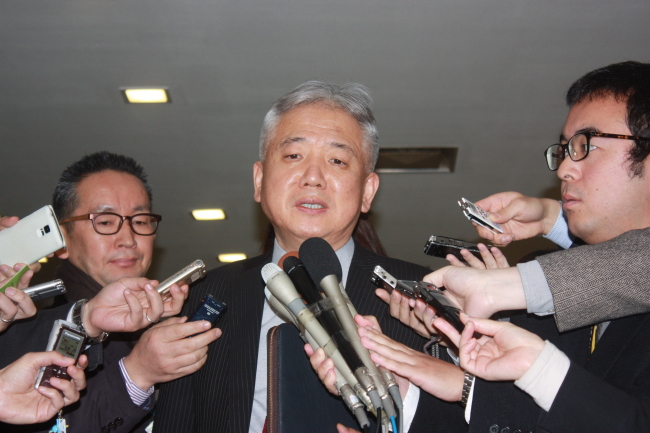Seoul and Tokyo failed to bridge their differences Tuesday over the issue of Japan’s colonial-era sexual enslavement of Korean women during their 11th round of director-general-level talks in Tokyo, dashing hopes of settling it by the end of the year.
 |
Lee Sang-deok, director general of Northeast Asian affairs at Seoul`s Foreign Ministry speaks to the press in Tokyo on Tuesday. (Yonhap) |
The two sides agreed to hold an additional round of consultations at the “earliest date,” Lee Sang-deok, director general of Northeast Asian affairs at Seoul’s Foreign Ministry told reporters after talks with his counterpart Kimihiro Ishikane.
“Now, we are nearing the end of the year. So … wouldn’t it be difficult to hold another session within this year?” Lee said in response to a reporter’s question whether another session would be held later this month to settle the issue involving Korean victims, euphemistically called “comfort women.”
The two countries have been struggling to address the comfort women issue, one of the thorniest bilateral sticking points, since their leaders agreed to accelerate negotiations during their first-ever summit in Seoul last month.
Asked if there has been any progress in bilateral negotiations over the issue, Lee said, “It is still too early to make any evaluations regarding our talks at this point. I would like to refrain from making any concrete evaluations.”
Since the first round of director-general-level talks in April 2014, the two sides have been adamant on their positions.
Japan has maintained the issue was already settled under a 1965 treaty normalizing bilateral ties. Article II of the treaty states the problem concerning property, rights and interests of the two contracting parties and their nationals has been settled “completely and finally.”
However, Seoul claims that the issue was not on the agenda for the negotiations over the treaty at the time, given that it was only in the 1990s that victims and civil society started to raise the issue. It also claims it is a wartime human rights issue that should be dealt with separately from the treaty.
There are 46 known surviving Korean victims, who are an average of 89.2 years old.
By Song Sang-ho (
sshluck@heraldcorp.com)








